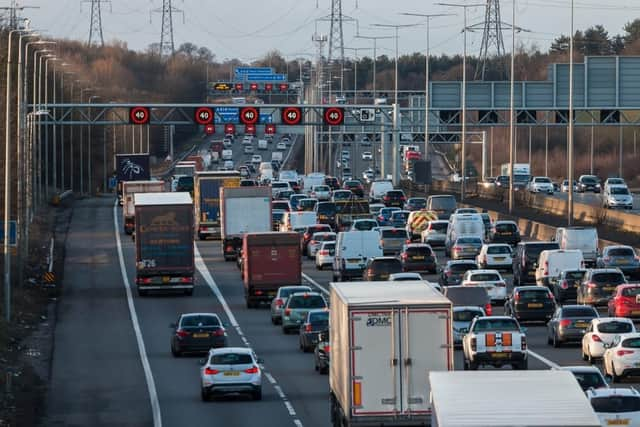Speeders get 60-second grace period on smart motorways


Drivers are given a one-minute ‘grace period’ when variable speed limits change on smart motorways, according to new research.
A Freedom of Information request by Auto Express revealed that speed cameras do not immediately activate when a speed limit is reduced but allow a 60-second gap for approaching drivers to respond.
Advertisement
Hide AdAdvertisement
Hide AdDrivers on smart motorways are notified of a change in speed limit via overhead gantry signs. Cameras mounted in the same gantries then monitor vehicles’ speeds, issuing tickets if they break the new limit.


Responding to the Auto Express FOI, Highways England, which oversees the existing smart motorway network, said: “Following a change in the speed displayed by signals there is a 60-second ‘grace period’ before HADECS3 cameras start enforcement, giving time for drivers to adapt to the new mandatory speed limit, especially when speed limits are reduced due to slow-moving or queuing traffic up ahead.
“This gives drivers time to slow down and reduces the need for braking sharply.”
Limits matched to road conditions
The grace period means that any approaching driver should have time to adapt their speed to suit the new limit but those who continue to exceed it can expect at least a £100 fine and three points on their licence.
Advertisement
Hide AdAdvertisement
Hide AdSmart motorways, like regular motorways, have a default speed limit of 70mph but this can be reduced to 60, 50 or 40mph by Highways England operatives depending on weather, traffic or breakdowns.
Speed limits on smart motorways can be lowered to deal with heavy traffic or other issues (Photo: Shutterstock)
In the past there has been confusion around how variable limits work and whether speed cameras operate all of the time. Highways England has confirmed that even if there is no variable limit in place the cameras will still detect drivers exceeding the regular 70mph motorway limit.
The AA’s head of roads policy, Jack Cousens, told Auto Express: “A 60-second grace period seems sensible and allows more than enough time for drivers further back to slow down safely.”
Advertisement
Hide AdAdvertisement
Hide AdSmart motorways put on hold
The roll-out of smart motorways has been put on hold following concerns over their safety.
Transport Secretary Grant Shapps told Parliament that no new stretches of smart motorway will be opened until a “stocktake” of the existing roads takes place. He said: "The stretch of the M20 and all other stretches that are currently being worked on will not be opened until we have the outcome of the stocktake."
There are currently more than 20 sections of smart motorway covering around 400 miles of road across England. The stocktake of their safety record comes after motoring organisations raised concerns over their implementation and a BBC documentary uncovered evidence of a huge increase in near misses on smart motorways, as well as at least 38 deaths.
Criticisms of the roads include concerns over the lack of hard shoulders, the distance between emergency refuge areas, and problems with broken-down vehicle detection, leading to cars being stranded in live lanes for up to 17 minutes.